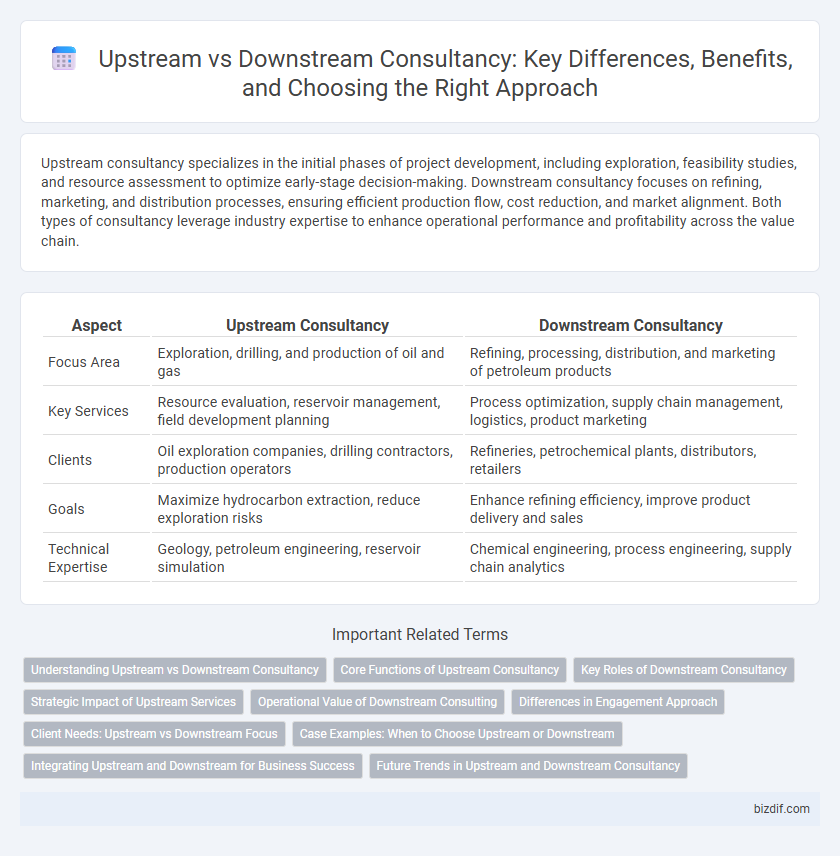Upstream consultancy specializes in the initial phases of project development, including exploration, feasibility studies, and resource assessment to optimize early-stage decision-making. Downstream consultancy focuses on refining, marketing, and distribution processes, ensuring efficient production flow, cost reduction, and market alignment. Both types of consultancy leverage industry expertise to enhance operational performance and profitability across the value chain.
Table of Comparison
| Aspect | Upstream Consultancy | Downstream Consultancy |
|---|---|---|
| Focus Area | Exploration, drilling, and production of oil and gas | Refining, processing, distribution, and marketing of petroleum products |
| Key Services | Resource evaluation, reservoir management, field development planning | Process optimization, supply chain management, logistics, product marketing |
| Clients | Oil exploration companies, drilling contractors, production operators | Refineries, petrochemical plants, distributors, retailers |
| Goals | Maximize hydrocarbon extraction, reduce exploration risks | Enhance refining efficiency, improve product delivery and sales |
| Technical Expertise | Geology, petroleum engineering, reservoir simulation | Chemical engineering, process engineering, supply chain analytics |
Understanding Upstream vs Downstream Consultancy
Upstream consultancy focuses on the initial stages of project development, including exploration, research, and strategic planning to identify opportunities and mitigate risks. Downstream consultancy addresses the later phases such as production, processing, distribution, and market positioning to optimize operational efficiency and profitability. Understanding the differences between upstream and downstream consultancy helps businesses tailor solutions to specific phases of the value chain for maximum impact.
Core Functions of Upstream Consultancy
Upstream consultancy primarily focuses on core functions such as exploration, reservoir characterization, drilling optimization, and production enhancement strategies within the oil and gas sector. These services involve geological and petrophysical analysis, reservoir modeling, and well planning to maximize resource extraction efficiency and reduce operational risks. Expertise in upstream consultancy drives strategic decision-making during the initial phases of hydrocarbon development, directly impacting exploration success and field development outcomes.
Key Roles of Downstream Consultancy
Downstream consultancy primarily focuses on optimizing refinery operations, product distribution, and market strategy to enhance profitability and compliance within the petrochemical and energy sectors. Key roles include process optimization, supply chain management, regulatory adherence, and product portfolio development tailored to downstream activities such as refining, marketing, and distribution. These consultants provide critical insights that drive efficiency, reduce operational costs, and improve market competitiveness in the downstream value chain.
Strategic Impact of Upstream Services
Upstream consultancy focuses on early-stage exploration and development strategies that optimize resource identification, risk assessment, and project feasibility, directly influencing long-term profitability and operational efficiency in the oil and gas sector. These services drive innovation in reservoir management, field development planning, and technology integration, resulting in enhanced decision-making and strategic positioning for competitive advantage. Unlike downstream consultancy, which centers on refining and distribution, upstream consultancy delivers critical insights that shape foundational business strategies and investment priorities.
Operational Value of Downstream Consulting
Downstream consultancy maximizes operational efficiency by optimizing refining, distribution, and retail processes, directly impacting profitability and supply chain management. It leverages data analytics to enhance inventory control, production scheduling, and regulatory compliance, reducing costs and improving product quality. This operational focus drives tangible value through increased throughput and minimized downtime in refining and petrochemical operations.
Differences in Engagement Approach
Upstream consultancy emphasizes strategic planning and market analysis, engaging clients early to define project scope and investment decisions. Downstream consultancy focuses on operational efficiency and product delivery, working closely with clients to optimize processes and supply chain management. Upstream engagements are often long-term and exploratory, while downstream projects are typically more tactical and execution-driven.
Client Needs: Upstream vs Downstream Focus
Upstream consultancy prioritizes strategic planning, exploration, and development processes to help clients identify growth opportunities and optimize resource acquisition. Downstream consultancy concentrates on refining operations, distribution, and marketing strategies to enhance product delivery and customer satisfaction. Tailoring consultancy services to a client's position in the value chain ensures targeted solutions that maximize operational efficiency and market responsiveness.
Case Examples: When to Choose Upstream or Downstream
Upstream consultancy is ideal for early-stage projects involving exploration, feasibility studies, and resource identification, such as advising oil companies on seismic data analysis or reservoir modeling. Downstream consultancy excels in optimizing refining processes, distribution networks, and marketing strategies, demonstrated by projects improving fuel supply chain efficiency or enhancing petrochemical plant operations. Choosing between upstream or downstream consultancy depends on whether the focus is on resource acquisition and development or product processing and market delivery.
Integrating Upstream and Downstream for Business Success
Integrating upstream consultancy, which focuses on exploration, production strategy, and resource management, with downstream consultancy, specializing in refining, distribution, and marketing optimization, creates a comprehensive value chain approach that enhances operational efficiency and maximizes profit margins. Effective collaboration between upstream and downstream sectors ensures seamless workflows, reduces bottlenecks, and aligns supply chain dynamics with market demand forecasts. Leveraging data analytics and process integration tools within both upstream and downstream functions supports strategic decision-making and drives sustainable business growth.
Future Trends in Upstream and Downstream Consultancy
Future trends in upstream consultancy emphasize digital transformation, leveraging AI and machine learning to optimize exploration and production efficiency while enhancing data analytics for predictive maintenance. Downstream consultancy is increasingly focusing on sustainability through advanced process optimization, integration of renewable energy sources, and adoption of circular economy principles to reduce carbon footprints. Both segments are expected to accelerate their investment in automation, digital twins, and real-time monitoring to improve operational resilience and adapt to evolving regulatory landscapes.
Upstream consultancy vs Downstream consultancy Infographic

 bizdif.com
bizdif.com